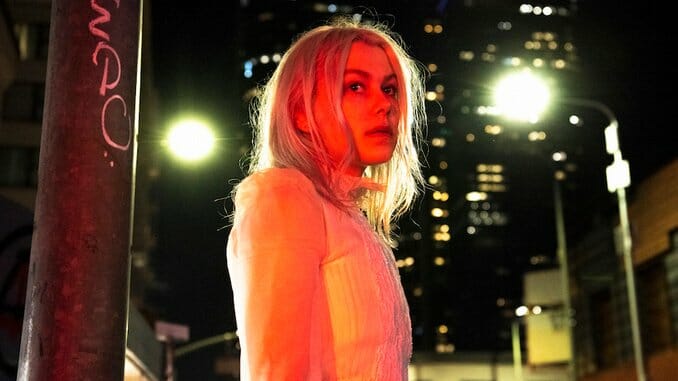The Irresistible New Pastime of Collectively Crying to Phoebe Bridgers
When the world feels like too much, just do what your friends are doing: Listen to Punisher.
Photo by Frank Ockenfels
Phoebe Bridgers is part of the zeitgeist now. There’s no doubt about it: She’s now graduated from critical darling to beloved music personality on the brink of pop culture recognizability. Liking Phoebe Bridgers is like being caught up on all the best b-list HBO shows, watching A24 movies or reading Jia Tolentino: It’s cool.
When I first heard Bridgers, it was at the tail-end of 2017, following the release of her adored debut album Stranger in the Alps. Her song “Smoke Signals” landed on many year-end lists, and I remember myself and a group of musically like-minded friends growing attached to the album while studying for finals. We interviewed her for my college newspaper in the library basement and attended her 50-capacity show in a now-shuttered club in Birmingham, Ala. She had people’s attention, but no one really knew who she was.
Cut to almost three years later, and she has two acclaimed supergroup projects in her rearview and a devout social media following with hundreds of thousands of fans to match. She has toured and/or collaborated with indie giants like The National, Lord Huron and The 1975, not to mention her own teenage idol, Conor Oberst of Bright Eyes, who started a project with her called Better Oblivion Community Center. Her career is technically still in its infancy, but she’s already in the early stages of doing what so many indie artists continually struggle to do: cross over to mainstream popularity. She’s obviously not topping Billboard charts or opening for Post Malone, but she’s making a name for herself as one of the foremost songwriters of her generation, gaining a Wilco-like reputation with one foot in the indie world and one outside of it. Maybe you don’t listen to her personally, but your friend probably does. Maybe her new album Punisher isn’t really your thing, but you always like her tweets when they pop up on your feed. Your parents don’t know who she is (or they just think she and Phoebe Waller-Bridge are one in the same), but your cool cousin wore her t-shirt to Thanksgiving.
It also helps that Bridgers is an anxious millennial’s dream come true. Now 25, she has a foothold on the emo-folk genre—a sound that hasn’t been hugely popular (apart from, say, The Front Bottoms) since Bright Eyes or Elliott Smith—and juices up her folk-indebted songs with morose humor, devastating details and plenty of grounds for crying. She’s blunt in interviews, clever on camera and hilarious on Instagram. She has an unmistakable goth energy (and a self-professed love of “goth shit”), but you don’t need to wear all black to latch onto her vibe. She’s involved in social justice issues in a way that feels earnest. As one profile put it: Everyone wants to be her friend.
And since friendship with our favorite musicians has never been a reality, everyone is doing the next best thing: listening to her sophomore album Punisher on repeat. The record, which we at Paste described as feeling “not just sad, but real,” arrives at a particularly inconvenient time for music releases. We’re several months into a global pandemic, and touring has thus fizzled, so there’s no way to promote a record on the road as one normally would. Throw in a long overdue uprising against racial injustice, and it can feel like there’s really no point in releasing an album right now at all.
Bridgers handled that aspect well: “I’m not pushing the record until things go back to ‘normal’ because I don’t think they should,” she tweeted last Thursday, just before releasing the album 24 hours early. She remains devoted to the Black Lives Matter movement, as we all should.
-

-

-

-

-

-

-

-

-

-

-

-

-

-

-

-

-

-

-

-

-

-

-

-

-

-

-

-

-

-

-

-

-

-

-

-

-

-

-

-








































